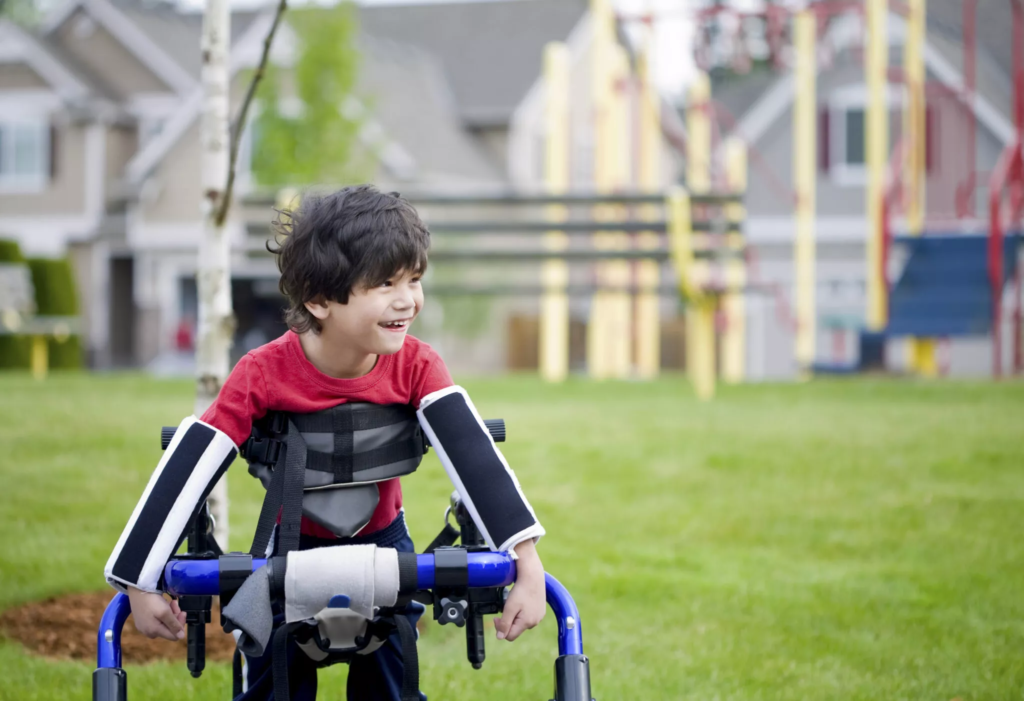

“Duchenne Muscular Dystrophy (DMD) is a genetic disorder that progressively causes muscle degeneration throughout the body, leading to weakness and increasing disability. It is one of the most common forms of muscular dystrophy, with an annual incidence of 1 in 3,500 births worldwide.
Duchenne Muscular Dystrophy (DMD) primarily affects boys due to its X-linked inheritance pattern. Symptoms usually manifest around the age of 3-5 or even earlier. Girls can be carriers of the mutated gene and typically do not develop the disease, although they may experience muscle weakness and fatigue or cardiomyopathy at a later age.
Managing and treating Duchenne Muscular Dystrophy requires regular and multidisciplinary care from experienced healthcare professionals and support staff with various interventions. When a boy is diagnosed with DMD, it is essential to seek medical advice and perform necessary tests on family members who may be carriers or at risk of developing the condition. Physical therapy, combined with orthopedic aids and wheelchairs, orthopedic interventions when necessary, and symptomatic drug therapy, can reduce complications of the disease and improve functionality and quality of life.
Innovative Therapies
Innovative therapies for Duchenne Muscular Dystrophy have been introduced into clinical practice in recent years, with more in experimental stages or on the verge of clinical trials. Most of these therapies aim to increase the amount of dystrophin in muscles. Due to the large size of the dystrophin gene, it is challenging to deliver it to the body using viral vectors. Therefore, researchers focus on producing a smaller dystrophin, either through the replacement of a mini DMD gene (gene replacement), intervention at the mRNA level to prevent premature protein degradation due to specific premature termination mutations (read-through for premature stop codons), or skipping of incompatible exons resulting from deletions or duplications of DNA (exon skipping) to achieve the production of a smaller dystrophin.
In a significant development, the U.S. Food and Drug Administration (FDA) provisionally approved a new gene therapy for DMD patients aged 4-5 (Elevidys) for the first time in an emergency phase last June. It uses an adeno-associated viral (AAV) vector, which, after intravenous administration, transfers an artificial gene for a micro-dystrophin to muscle cells, where it begins to be produced and takes over some of the dystrophin’s functions inside muscle cells. The ongoing EMBARΚ study in 140 children with DMD has shown preliminary production of micro-dystrophin and an improvement in the clinical picture, particularly in this age group of patients. The expected final results of the Phase 3 clinical trial will help confirm and possibly approve the drug.
In addition to this treatment, other gene therapies for DMD are currently being tested. These include various variants of micro-dystrophin or the transfer of other genes that can stabilize muscle cells. New gene editing technologies, precise interventions for repairing genetic defects (such as gene editing CRISPR/Cas9, Prime editing), are also in development in experimental preclinical models of DMD. All of these advancements hold promise for a better prognosis and more effective treatment of the disease in the near future.
Neuromuscular Diseases Center in Cyprus
In our country, the Neuromuscular Diseases Center – the muscular dystrophy clinic of the Cyprus Institute of Neurology and Genetics (CING) has been at the forefront of diagnosing, treating, and providing multidisciplinary care for DMD patients for the past 30 years. The Center deals with the diagnosis and treatment of conditions such as myopathies and muscular dystrophies, motor neuron disease, myasthenia gravis, and peripheral neuropathies. It is supported by unique specialized laboratories in Cyprus, including electromyography, neurology, neurogenetics, biochemistry, and more. The Center implements new and specialized therapies for both local and international patients based on specific protocols and offers comprehensive care. Moreover, the center feeds into pioneering research programs involving clinical and basic research and provides education to medical and paramedical personnel. The Neuromuscular Diseases Center was accepted as an affiliated member of the European Reference Network for Neuromuscular Diseases (ERN-Neuromuscular), based in Paris, which involves top academic institutions from across Europe.
The Center provides comprehensive care for patients with neuromuscular diseases, including a multidisciplinary team consisting of a pulmonologist, orthopedic specialist, cardiologist, endocrinologist, gastroenterologist, dietitian, and speech therapist. It also offers support through genetic counseling, psychological support, and social services. Special emphasis is placed on physical therapy, with highly trained personnel for individual and group therapy to address mobility problems.
The Center has all the means for a complete diagnosis of neuromuscular diseases. The Electromyography Laboratory offers specialized electrophysiological examinations for identifying and characterizing dysfunction in the neuromuscular system. The Neuropathology Laboratory provides specialized diagnostic services concerning muscle and nerve biopsies for accurate diagnosis of neuromuscular diseases like muscular dystrophy, utilizing a wide range of histological and immunocytochemical techniques to evaluate the molecular structure and various metabolic functions of muscles.
Diagnostic Tests
The Department of Neurogenetics at CING closely collaborates with the Neuromuscular Diseases Center, providing a wide range of genetic diagnostic tests for most of the diseases monitored at the Center. The Department offers genetic DNA testing for patients, studies in families, and the possibility of next-generation sequencing for diagnostic and research purposes. The Biochemical Genetics Department at CING provides specialized laboratory tests on blood and muscle samples for the diagnosis of metabolic and other diseases. Additionally, the Thalassemia Department at CING offers pre-implantation diagnosis services for families with neuromuscular diseases.
Clinical trials for the treatment of Neuromuscular Diseases are conducted at the Center, as well as translational and basic research focusing on the diagnosis and treatment of neuromuscular diseases. Currently, there are four clinical trials underway for new therapeutic drugs for hereditary amyloid polyneuropathy (FAP) and autoimmune myositis.
Dr. Kleopas A. Kleopa is a Senior Neurologist, Director of the Department of Neurosciences, and Coordinator of the Neuromuscular Diseases Center at the Cyprus Institute of Neurology (CING).
Source: Φilenews



